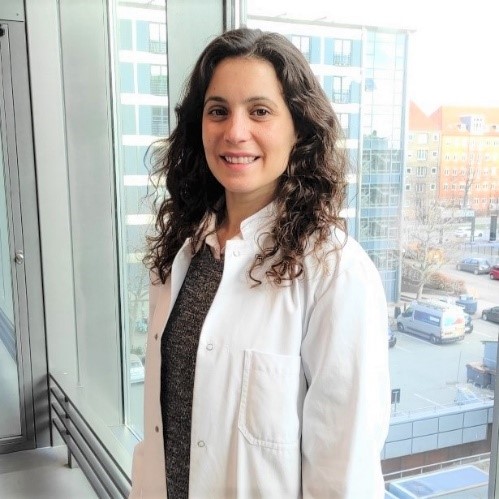Sofia Bentivegna
 Name: Sofia Bentivegna
Name: Sofia Bentivegna
Nationality: Argentinian
Academic Background: Biotechnology (Universidad Nacional del Litoral, Argentina)
Project Title: Identification of potential targets for immune therapy in clonal cytopenia.
Project Background: Hematopoiesis is the process where the hematopoietic stem and progenitor cells (HSPC), located in the bone marrow, differentiate to all the mature cells present in the blood. Myelodysplastic syndrome (MDS) represent a heterogeneous group of disorders characterized by ineffective hematopoiesis, cytopenias (a reduced number of one or more type of cells in the blood) and an increased risk of developing acute myeloid leukemia (AML), which has a poor prognosis. Bone marrow transplantation is the only curative treatment of MDS for most of the patients, but this procedure is associated with a high risk of transplant-related morbidity and mortality.
Some patients with cytopenias do not meet the diagnostic criteria for MDS or other hematological disorders. If these patients have somatic mutations in MDS-associated genes in the blood and bone marrow cells, they are referred to have clonal cytopenia of undetermined significance (CCUS). Patients with CCUS have an increased risk of developing MDS and AML in the following 1-10 years after the diagnosis. It is not known if the development of leukemia in patients with CCUS or MDS can be prevented or postponed. One thing we know is that the immune system is altered in MDS, and MDS cells are dependent on the microenvironment, but at this point, there is little knowledge about the exact immune cell composition and the immunological mechanisms in CCUS.
Myeloid derived suppressor cells (MDSC) are very powerful suppressor cells that infiltrate the bone marrow microenvironment in MDS, suppress a potential immune-mediated response against the malignant HSPC and affect the normal hematopoiesis. Different groups reported an expansion of MDSC in MDS, and an increased number of MDSC is associated with disease progression.
Anti-regulatory T cells (anti-Tregs) are defined as cells that can specifically react to regulatory immune cells, including MDSC, and restrict the range of immunosuppressive signals mediated by such cells. Anti-Tregs recognize proteins that MDSC and tumor cells express. The stimulation of endogenous anti-Tregs as a novel cancer therapy combine the functional inhibition of MDSC with the assistance of the adaptive immune response, by secreting pro-inflammatory cytokines into the microenvironment.
Project Aim: The overall question of the present PhD project is whether we can stimulate anti-Tregs with peptide-based vaccines in order to deplete MDSC, with the final intention of postpone/prevent leukemia development and progression in patients with CCUS and MDS. Specifically, we want to:
- Analyze the immune profile of CCUS/MDS patients to unravel the immune mechanisms behind the progression and development of leukemia.
- Investigate the presence of anti-Treg cells in patients’ samples and their reactivity towards immunogenic peptides derived from inhibitory molecules or enzymes released by MDSC.
- Examine if in an in vivo model we can revert a leukemic phenotype using peptide-based vaccines that stimulates anti-Treg cells.
Expected Outcome: We hope this project will generate pre-clinical data that can be used to design a clinical trial, which potentially will have great clinical impact in a patient group for whom very few treatment options are currently available.
Contact: sofia.bentivegna@bric.ku.dk
